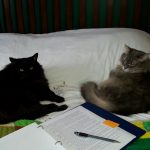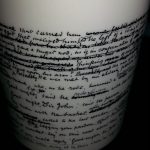
My blog has been quiet lately because I’ve been immersed in a major revision of my latest novel. When I start a major revision I always feel overwhelmed at first, especially when I see detailed comments from beta readers or my agent. This time was especially scary because I knew I had to delete at least 15,000 words as well as a major character (more on that below). But once I plunged in, it was the most rewarding (rewording?) and exciting revision process I’ve ever experienced.
It felt a lot like falling in love. I was consumed by my characters and could think of nothing else. I lost sleep because I couldn’t turn off my brain, which was whirring madly as it tried to stitch together the gaps that opened up as I deleted huge chunks of the story. Social interaction with real people was especially difficult. To be honest, the only time I could really focus when talking to other people was when I was talking about my novel (a thousand apologies to my very patient husband!). It was a roller-coaster of wild emotions and an aching back, neck, and shoulders from sitting in the same position with my laptop for many hours at a time. I forgot to reply to emails, forgot appointments and deadlines, and most shocking of all, sometimes even forgot to eat!
Just like falling in love, it was exciting, but I knew I couldn’t keep up the momentum and would eventually have to return to reality. I was looking forward to getting back to my normal life, but I also enjoyed the ride. It was a refreshing change from the writer’s block I sometimes experience.
When I was first starting out as a writer, I used to dislike revision. It felt like chipping away at a huge rock with a tiny knife. Part of my problem was that I spent too much time polishing my sentences and not enough time considering the overall story structure and pacing. It’s pretty hard to kill a sentence that you’ve spent an hour polishing, even when you know it doesn’t fit the story.
It’s hard to admit this, but I also suffered from a lack of humility. I thought I was already a good writer. As an English professor who has spent my life reading and writing, as well as editing the writing of others, I thought I had all aspects of writing figured out. This prideful attitude cost me years of stubborn resistance to learning how to write a good story. I now understand that no matter how good a writer I (or others) think I am, I can always learn from others and my writing can always improve.
Another way I’ve changed is that I now want to communicate with others through my writing. I used to write only for myself and didn’t care if anyone else read what I wrote. I existed in a happy little fantasy world with my characters. Why would I need to revise when I knew what I was trying to say?

I’ve attended several writing workshops led by the amazing Kathleen Norris. She talks about self-expression being important only in the initial stages of writing, but if you want readers, revision is necessary. For Norris, readers complete our writing and constitute a community. Revision is both a spiritual discipline and a kind of hospitality, inviting the reader in. And it requires humility to put ourselves and our feelings aside when it’s time to communicate with readers.
As I’ve learned to love revision, I’ve also learned to appreciate critiques from thoughtful beta readers and critique partners (for an excellent explanation of the difference between critique partners and beta readers, see this article). I don’t believe any writer has the objectivity needed to properly critique her own work, not even after setting aside a manuscript for a period of time. Other eyes are needed.
I especially love my beta readers and am constantly amazed by their generosity. Everyone is busy and it’s asking a lot to expect someone to read an entire novel carefully and critically, then write down suggestions for revision in a way that is helpful instead of harsh. One beta reader in particular blew my mind with her incredibly balanced, specific comments throughout the manuscript. It was like having a friend sit beside me as I revised each chapter, pointing out what I did well and what I needed to improve.
One revision I was initially skeptical about was deleting a major character. My agent was the one who suggested this, but I could see how it would solve problems my beta readers mentioned too. Yet it was scary to think that a character I thought was important could be removed without hurting the story. Imagine my surprise when I deleted this character, only to find that the novel was better without her.
This deletion prompted an existential crisis in my life. I started to wonder, am I that person who could be deleted from the overall story with no discernible effect? But as I thought more about this character, I realized that the novel wasn’t her story. If she (or I) can be deleted from someone else’s story, that’s ok. And when I’m faced with my own insignificance, I remind myself of this lovely line from Dickens’ Our Mutual Friend: “No one is useless in this world who lightens the burden of it for anyone else.”
Falling in Love with Revision
2 Comments
Leave a Reply
You must be logged in to post a comment.
You’re so right about humility! I think that academic writing – assuming the voice of an expert – might not be a helpful mindset for the rest of life. (Ask me how I know this!)
Very well put. I’ve had to unlearn so much of my academic training in order to be a better writer and a better person. I’m still working on it!